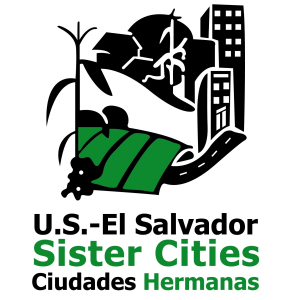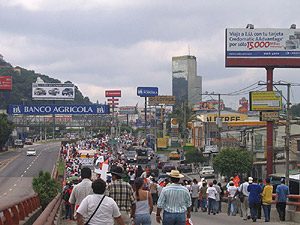Sister Cities
CRIPDES’ Review of the Trial to Date – August 9, 2007
STATEMENT OF CRIPDES AND THE SOCIAL ORGANIZATIONS: TO THE SALVADORAN PEOPLE AND THE INTERNATIONAL COMMUNITY
August 9, 2007
The consequences of the events in Suchitoto which took place on the 2nd of July demonstrate to the Salvadoran population the dangerous anti-democratic attack which threatens citizens and foreigners residing in Salvadoran territories.
This reality obliges us to remember the steps that were established to propel the peace process in El Salvador, which identified four objectives for the process: 1) end the armed conflict through negotiation, 2) promote the democratization of the country, 3) guarantee the unrestricted respect for human rights and 4) reunite the Salvadoran society. We find those objectives ever more distant from having been achieved. Upon analyzing each one of these objectives, we see with concern a return to authoritarianism in areas of civil and political rights, and the increasing deterioration of the conditions of life faced by the Salvadoran population.
Add to this reality the absence of the separation of powers, one of the fundamental pillars of democracy, and we find that we are once again in a decisive moment in history: the return to authoritarianism which is growing, once again counts with the weakness of the Judicial Branch, which by action or omission is part of this attack against the constitutional liberties and the respect of human rights.
There have been two important factors in the struggle for the freedom of the 13 political prisoners to date:
1. Solidarity and accompaniment.
Just as occurred after the 5th of July in 2006, this situation has brought together diverse organized social sectors, aware that in isolation it is not possible to advocate after the serious events the country is experiencing, and even less so in the construction of a future for the Salvadoran people.
The creativity, the opportunity and the overwhelming participation by the Salvadoran society in protest of the repression of the social movement and the capture of the political prisoners, has been important. This has given us clear examples of organization in action, of coordination and indignant action, prepared to not allow El Salvador to repeat the history it has lived through.
But it is also important to highlight the immediate international reaction, which was concerned by the Salvadoran situation, and has shown solidarity and accompaniment.
The quantity of people, organizations, and international institutions that have asked for explanations from the Salvadoran government about the treatment of the people being prosecuted for the events in Suchitoto on the 2nd of July has also been overwhelming. The rejection of the use of the Law against Acts of Terrorism (LECAT for initials in Spanish), the Law against Organized Crime and the function of the special courts, in this case concretely, has been heard from all around the world.
2. The committee of family members of political prisoners of El Salvador
One of the most important things that happened, was the formation of the Committee of Family Members of the Political Prisoners of El Salvador; it was formed because of the abuses and mistreatment of those who were detained, fundamentally, because of the knowledge that a “political trail” was beginning, outside the margin of the constitutional mandates, and the decisions in the administrative and judicial areas, have been predetermined decisions, which have been guaranteed by:
a) the use of laws and procedures that do not guarantee the right due process and a fair trial;
b) The function of the Attorney General of the Republic (FGR in Spanish) that responds, without any doubt, to interests outside his constitutional mandate. This is demonstrated by reading the charges against the 13, “for Acts of Terrorism for endangering the life, the personal integrity or integrity of public servants or persons internationally protected.” Originally they were accused of the crime of “public disorder” but the FGR changed the charges.
c) The use of specialized courts, which have been created as a way of impeding that these cases, tried under laws that appear to be unconstitutional, are brought before a jury and given a fair trail as any citizen; the special judges, are a guarantee that innocence until proven guilty will be set aside in favor detainment.
The Penal Process
Preliminary Hearing, July 5th
On the 5th of July, 2007, a special court was presented an argument by the prosecuting attorney Mirna Elizabeth Molina Cisneros for provisional detention for the 14 people detained.
The evidence presented by the Prosecuting Attorneys is plagued by irregularities, including serious falsifications, such as the alleged fact that the police asked that “the representatives of the protesting group to please leave the highway,” and upon making that request, the document of the prosecution says that the protesters interfered and obstructed vehicular traffic and especially public servants of the first class, such as the President of the Republic, who was travelling to the Port of San Juan; Mr. Saca was never within more than 2 kilometres of the place where the events occurred, he did not travel on the highway, he flew in helicopter.
The basis for the provisional detention of the 13 charged, and to determine their probable participation in the events was the following:
a) Written statements;
b) interviews with the agents who captured the defendants, who in the capacity of witnesses determined the circumstances, time and place of the events, as well as the action of collective and individual character which put at risk the life and physical integrity of high officials of the State.
c) The inspection of different places in the highway and the city of Suchitoto that evidence that the transit of vehicles pedestrians was obstructed.
With the above evidence they claimed sufficient evidence to try the defendants for Acts of Terrorism, taking into account the alleged fact that they “had generated social alarm and the illegal actions of the defendants and their accompaniers was carried out in a premeditated way” but also it was expressed that if given conditional liberty they could destroy, modify, or hide the evidence, which was the basis for asking for the preventative detention.
July 7th Hearing
On July 7th, Lucila Fuentes de Paz announced a similar verdict, after the Prosecution presented testimonies by the police officers that captured the defendants, videos, and the testimony of one person who claimed that he was asked by the defendants to attend the protest against Tony Saca. Once again, the FGR stressed that it was a planned action, organized in a premeditated way, and linking that to the charges of acts of terrorism. According to the judge the events fit the description of Acts of Terrorism, which was the justification used for the detention of 13 people, despite the fact that the prosecuting attorney did not present evidence that the defendants participated in “criminal conduct that, through planned acts of extreme violence or serious intimidation or with subversive goals, try to destroy the political system (democratic) of a country.” The judge dropped the charges of public disorder and participation in illicit organizations.
First Appeal, July 18
After submitting an appeal, on July 18th the judges Gloria Lizama y Sandra Luz Chicas granted conditional liberty to 4 of the 13 detained, including José Heber Fuentes Herrera, Sandra Isabel Guatemala, María Haydée Chicas and Beatriz Eugenia Nuila González. All four were ordered to present themselves every 15 days before a Special Judge, and restricted from leaving the country or changing their place of residence. The detention of the remaining nine detainees was upheld, and the judge argued that the defendants had not satisfactorily shown they would not flee.
Second Appeal, July 26
The defense presented a second appeal, asking that the remaining nine in provisional detention be released, and on Friday July 27th all nine were released from prison, including: Marta Lorena Araujo Martínez, Rosa María Centeno Valle, Manuel Antonio Rodríguez Escalante, Héctor Antonio Ventura Vásquez, Vicente Vásquez Basilio, Marta Yanira Méndez, Clemente Guevara Batrez, Santos Noé Mancia Ramírez y Gertrudis Patricio Valladares Aquino.
It is important to clarify that the prosecution of the 13 of the 14 people detained in Suchitoto for ACTS OF TERRORISM is still in process, and they are under conditional liberty. This period of three months starting July 8 was granted to the FGR to collect evidence. Once the three months are up, they will be brought to trail.
It is worth keeping in mind, that none of the authorities responsible for investigating the disorder in Suchitoto has begun an investigation of the reports of abuse of authority, and physical and psychological torture that was carried out on the detained.
Other Legal Proceedings
Two petitions for Habeas Corpus were presented to the Supreme Court, and neither one was reviewed; a request was made to the Inter-American Commission on Human Rights (CIDH in Spanish), asking it to demand a report from the Salvadoran Government about the events; the CIDH requested the report from the Salvadoran Government on July 19th.
Threats to the fundamental liberties of the Constitution
We must work to revoke or stop the passage of the following laws:
- The Special Law Against Acts of Terrorism
- The Special Law Against Organized Crime
- The proposed Penal Code changes that would increase the sentence for public disorder
- Any law that allows the use of special judges


